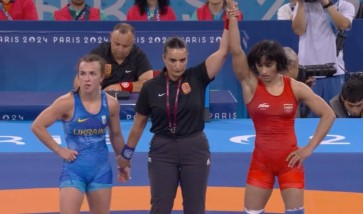In a heart-wrenching turn of events, Indian wrestler Vinesh Phogat faced disqualification from the women’s freestyle 50 kg wrestling competition at the Paris Olympics 2024 due to being overweight.
The disqualification occurred on the morning of her anticipated gold medal bout, marking a significant blow to her Olympic journey.
According to the regulations set by United World Wrestling (UWW), the governing body for the sport, wrestlers must pass a weigh-in test prior to their competitions. If they fail this test, they are immediately disqualified and placed in the last position.
Consequently, despite reaching the finals, Vinesh became ineligible for any medal, including the silver she would have secured even if she lost the final bout.
The specific UWW rule regarding the weigh-in test states, “If an athlete does not attend or fails the weigh-in (the 1st or the 2nd weigh-in), he /she will be eliminated from the competition and ranked last, without rank.”
While the Indian Olympic Association (IOA) confirmed Vinesh’s disqualification, they did not provide detailed information about the weight discrepancy. However, multiple reports indicate that Vinesh was 100-150 grams over the 50 kg weight limit on Wednesday.
Vinesh had previously struggled with meeting weight limits. She barely made the 50 kg upper limit. She then won three bouts, including a significant victory over four-time world champion and Tokyo gold medalist Yui Susaki of Japan, making her the first Indian female wrestler to reach an Olympic final in any weight category. Unfortunately, she failed the crucial weigh-in test on Wednesday morning.
UWW Rules on Weigh-in
The UWW rules outline the procedure and importance of weigh-ins before international wrestling competitions. According to Chapter 3, Article 11 of the wrestling rules:
The weigh-in is organised each morning for the concerned weight-category and lasts for 30 minutes.
On the second morning of the weight category, only wrestlers participating in the repechages and finals need to weigh in, and this session lasts for 15 minutes.
On the day of the medal matches, Vinesh, her competitor USA’s Sarah Hildebrandt, and the repechage winners were subjected to a second weigh-in. Vinesh failed this weigh-in due to being overweight.
Wrestlers must present themselves at the weigh-in with their license and accreditation. The only uniform permitted for the weigh-in is the singlet. After a medical examination to ensure no contagious diseases, the wrestler can be weighed in without any weight tolerance for the singlet. Wrestlers can step on the scale as many times as they wish during the weigh-in period.
The referees overseeing the weigh-in are responsible for verifying that all wrestlers meet the weight requirements for their category and fulfill all necessary conditions. They must also inform wrestlers of the risks of presenting themselves on the mat in incorrect attire, and they will refuse to weigh any wrestler not dressed properly.
This strict adherence to weigh-in regulations highlights the importance of maintaining weight categories in wrestling to ensure fair competition, and unfortunately, Vinesh Phogat’s slight weight excess led to her disqualification and loss of a potential historic Olympic medal.

















